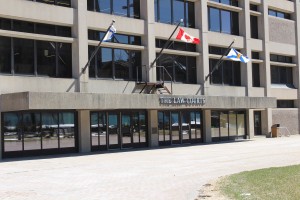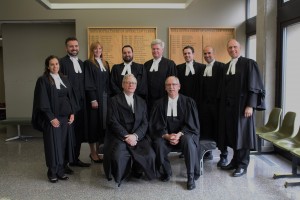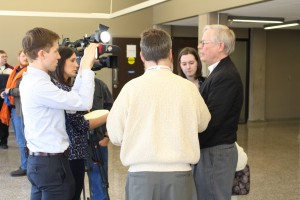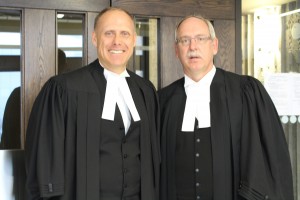- Will Lawyers In Canada Soon Face A Religious Test? The Hypersensitive Response Over Canada’s First Openly Christian Law School
- BC Law Society Approves TWU Law School Graduates
- The Cold Chill of the Legal Profession’s Rejection of Religious Freedom
- A Referendum On Religious Freedom
- Lawyers’ Referendum Not Just About TWU – It’s About Our Commitment To The Rule Of Law
- Called To Participate, But Not At The Table
- Hearing Update On Trinity Western University v. Nova Scotia Barristers’ Society
- Breaking News Supreme Court of Nova Scotia rules in favour of Trinity Western University …. more to come
- Space Enough For All: Nova Scotia Supreme Court Makes Decision on Trinity Western University Law School
- The Strange Case of Nova Scotia Barristers’ Society Appeal of the TWU Ruling
- CCCC Granted Intervener Status In TWU Case in British Columbia
- The Onward March of TWU: Next Step The Court of Appeal
- Trinity Western University and the Legal War of Attrition: Isn’t It Time To Let Diversity Flourish?
- Charitable Status of Un-Popular Opinion
- CCCC Denied Intervener Status at Ontario Court of Appeal
- CCCC Granted Intervener Status at the BC Court of Appeal on TWU Case
- Sending a Message to TWU: Your Graduates Need Not Apply
- Recent Happenings: CCCC Files Factum At BC Court of Appeal; Bussey appears on TV
- CCCC at the British Columbia Court of Appeal
- The Experts Demand Deference: Law Societies & TWU
- The Intolerance of Intolerance: The Outrageous Accusation That TWU’s School of Law Is Related To The Orlando Massacre
- Being On the Right Side of History: Where the Offended Take Away Religious Freedom
- Nova Scotia’s Highest Court Rules in Favour of TWU
- Common Sense Prevails at the Nova Scotia Court of Appeal
- Bussey on John Gormley Show
- Nova Scotia Barristers Society Will Not Appeal
- BC Court of Appeal On TWU
- Developing Story: BC Court of Appeal Rules 5-0 in favour of TWU
- The Decision That Has Changed Everything For TWU
- Law Society of BC Appeals TWU To Supreme Court of Canada
- Bussey in Vancouver Sun: Appeal court ruling on Trinity Western University is a game changer
- The Legal Revolution Against Religion
- Supreme Court Grants Leave On TWU
- Supreme Court Grants 9 But Denies 23 Groups Intervener Status In Landmark Case
- Canadian Council of Christian Charities Granted Intervener Status in TWU Case: The Supreme Court Changes Course On TWU Interveners
- Australian Group Interviews Bussey on Equality and Freedom of Religion
- Bruce Clemenger’s Video Message on TWU Case
- Oral Argument of CCCC on TWU at the Supreme Court of Canada
- June 15 TWU Decision To Be Released
- TWU Loses: Canada’s Religious Freedom Forever Altered
- The Constitutional Promise of Religious Freedom Betrayed
- TWU Drops Mandatory Community Covenant

The Law Courts, Halifax, Nova Scotia
I observed history last week at the hearing of the Nova Scotia Court of Appeal in the case of Trinity Western University School of Law (TWU). Over twenty lawyers were crammed into the Court Room on the 5th floor of The Law Courts, in downtown Halifax. It seemed only a short time before when I was there with my colleagues for the first hearing before Justice Jamie S. Campbell in December 2014. Justice Campbell ruled in favour of TWU, saying that the Canadian Charter of Rights was not a “blueprint for moral conformity.”[1] His decision was a stinging rebuke to the Nova Scotia Barrister’s Society’s (NSBS) refusal to recognize the TWU law degree. Campbell held that TWU’s religious freedom was unjustifiably violated. Not surprisingly, perhaps, the NSBS appealed his decision.

As I listened to the arguments of the Society justifying their denial of the TWU degree it was evident that a major purpose of their rejection was to send a message to TWU. However, the practical effect of that decision denied TWU law graduates the ability to practise law in Nova Scotia. The graduates are to suffer the ire of the Society for TWU’s religious position on marriage. According to Jill Perry, president of the Nova Scotia Barristers’ Society, the decision was “not about penalizing TWU graduates.” Rather, “[i]t’s about sending a message to the university that we as a law society have a problem with your admissions policies.”[2]
The NSBS is offended[3] by the Christian law school’s admission policy that requires students to sign a Community Covenant that commits them to maintaining a lifestyle that would abstain from, “sexual intimacy that violates the sacredness of marriage between a man and a woman.”[4]
The Regulations governing the Society stated that a “law degree” was defined as that degree approved by the Federation of Law Societies of Canada. The Society’s lawyers admitted that the Federation’s approval meant that the TWU degree was an approved degree in Nova Scotia. However, given the context, the Society did not want to recognize the degree. The Society held a Council meeting on April 25, 2014 and voted 10-9 not to approve the TWU program unless TWU either exempts law students from signing the Covenant or amends the Covenant “in a way that ceases to discriminate.”

Lawyer Brian Casey, representing TWU in media scrum
Unfortunately for the Society, it had no authority (and this is the matter of contention) under its own regulations to deny the degree on the basis of a law school’s admissions policy. Therefore, changes had to be made to the Regulations under the Legal Profession Act in order to legitimize the April decision. It was not until July 2014 that the Regulations were amended.
Notice the order of events here: first, the law school is approved by the Federation and as a result it is a lawfully recognized law degree in Nova Scotia; second, the NSBS does not want to recognize the law degree because it does not want to “condone” TWU’s allegedly “discriminatory” admissions policies; third, the Society’s regulations do not give the Society authority to disapprove the degree so it subsequently amends its regulations in July to retroactively support its April decision. One would have thought that the better approach would have been to make the changes in the Regulations first and then make a decision – but hindsight is always 20/20.
Now, in July 2014, the Society amends its regulations to say that after the Federation approves a law degree it will be recognized as such in Nova Scotia “unless Council, acting in the public interest, determines that the university granting the degree unlawfully discriminates in its law student admissions or enrolment policies or requirements on grounds prohibited by either or both the Charter of Rights and Freedoms and the Nova Scotia Human Rights Act….” (Emphasis added.)
Notice the word unlawfully. This is very important and it was picked up by the judges on the Court of Appeal.
The problem is this: TWU’s admissions policy is not “unlawful”! This is what Justice Campbell found in his January 2015 decision. TWU does not violate any law because it is exempt from both the Charter and the BC human rights legislation. Therefore, even on the basis of the Society’s own regulatory amendment, TWU is absolved from any legal challenge!
The irony is that these regulations were written by the very governing body of the legal profession. It did not help the irony any when the Advocate’s Society, whose tag line is “promoting excellence in advocacy,” called on the Court to simply cut through the “weeds” of argument about the meaning of the word “unlawfully” and allow the NSBS the latitude to do what it wants! As lawyers, words are our bread and butter; rarely do we treat them as mere weeds.
When confronted with the problem of using the word “unlawfully” the lawyers supporting the Society’s position tried a number of approaches. First, they argued that the admissions policy would be “unlawful” under the human rights legislation in Nova Scotia. However, the justices did not appear convinced with that answer. It troubled the Court that the policy was not of a law school in Nova Scotia but in British Columbia. There is an obvious problem with extraterritoriality. Simply put, how can the Nova Scotia Barristers’ Society rule on matters in BC? It is outside of their jurisdiction.
Second, they argued that the Society’s decision, in and of itself, being made in Nova Scotia, was bound by the Charter and the Nova Scotia Human Rights Act. Not to make a statement against TWU’s discrimination, they said, would be to condone that which is against “Charter values”. Charter values was argued to include the view expressed by Justice Abella in the Loyola [5] case as being concerned with “equality, human rights, and democracy.” TWU, it was claimed, discriminated against the LGB community with its admissions policy. Therefore, it was against those three “Charter values.”
That is a curious formulation. Here we have a university policy that was already vetted by the Supreme Court in 2001[6] and was found constitutional. Further, is it not strange that a “Charter value” would take away a positive Charter right – religious freedom? How have we come to the place where a notion such as a “Charter value” supersedes the actual protection of the Charter right itself? Consider that religion is an equality right; religious freedom is a human right; and Chief Justice Dickson in the seminal case on religious freedom (Big M Drug Mart [7]) noted that the principles of religious freedom undergirded our democratic system of government![8]
The issue of condoning is peculiar. The Society argued that if it accepted the TWU law degree it was condoning TWU’s discrimination. That simply does not flow. The locus of the Society’s work, in reviewing those wanting to practice law, is to ensure that they are competent with the requisite skills to practise law not whether their religious beliefs are acceptable. A government’s approval, or an issuance of a professional license does not mean the state actor is thereby approving the person’s religious beliefs or the beliefs of the institution where they were educated. To say otherwise would require the government coming up with its own list of acceptable religious beliefs and practices and then use it as a guide or a measuring stick to ensure it is fair. Does that not appear odd? Where would such an inquiry end? Will it matter only for professional licenses such as law? What about nursing, or teaching? What of other non-professional licenses such as driving? Or, what about the issuing of charitable status to churches and other charities – does the issuing of charitable status thereby imply government acceptance of the religious beliefs of the organization?

Barry W. Bussey with Kevin Sawatsky
It is apparent the Nova Scotia Barrister’s Society has a “tough row to hoe” on this one. And so they should. Rather than allow for a Canada that protects both the religious freedom right of Christians and the equality rights of the LGBT community in tandem, the Society decided to choose equality at the expense of religion. As my friend, Albertos Polizogopoulos noted, “[t]his is inclusion by exclusion….”[9]
The reality is we have a constitution that protects both rights. Ours is a society where we must be able to live peacefully on the same real estate. The right of all Canadians is to live their identity to the full. That may mean that there are some who are uncomfortable with the views and practices of others. However, if the Charter means anything it is that we are obliged to respect the rights of everyone.
The message that the Barrister’s Society sent, though it may not have intended it as such, was that any TWU law graduate that holds the traditional view of marriage is not welcome in Nova Scotia. That is unfortunate. I would hope that the Nova Scotia Court of Appeal now sends a message to the Society that affirms Justice Campbell’s decision that “[l]earning in an environment with people who promise to comply with the code is a religious practice and an expression of religious faith. There is nothing illegal or even rogue about that. That is a messy and uncomfortable fact of life in a pluralistic society.”[10]
The CCCC factum filed at the Nova Scotia Court of Appeal can be found here.
[1] Trinity Western University v. Nova Scotia Barristers’ Society, 2015 NSSC 25 (CanLII), <http://canlii.ca/t/gg386>, retrieved on 2016-04-12
[3] As is the Law Society of Upper Canada and the Law Society of British Columbia.
[4] Trinity Western University, “Community Covenant Agreement: Our Pledge to One Another.”
[5] Loyola High School v. Quebec (Attorney General), [2015] 1 SCR 613, 2015 SCC 12 (CanLII), <http://canlii.ca/t/ggrhf>, retrieved on 2016-04-13, see paras. 46-49.
[6] Trinity Western University v. British Columbia College of Teachers, [2001] 1 SCR 772, 2001 SCC 31 (CanLII), <http://canlii.ca/t/dmd>, retrieved on 2016-04-12
[7] R. v. Big M Drug Mart Ltd., [1985] 1 SCR 295, (CanLII), <http://canlii.ca/t/1fv2b>, retrieved on 2016-04-12
[8] R. v. Big M Drug Mart, at para. 122.
[9] https://www.cardus.ca/blog/2016/04/challenging-trinity-western-university
[10] Trinity Western University v. Nova Scotia Barristers’ Society, at para. 11.


Thanks Barry, very informative.
Excellent article, Barry! Pluralism works both ways, or all ways. It seems that the Barristers Society reacted as if Christians had taken over the government and required all schools to have such admissions policies. But what we have is an attempt to make a private school pay for not having the popular and politically correct view of today.
Thanks Blaine. There seems to be a move to make even private religious schools “public”. The argument goes that religion should stay within private confines – within the four walls of a church building for example. The moment churches get involved in such “public” enterprises as schools, nursing homes, hospitals, and so forth, then they forfeit their religious freedom. That is a very problematic position to take but it appears to be gaining traction in some quarters. The point is that many thought leaders “don’t get religion” – it is archaic, from yesteryear and we would all be better off without it. The reality is we are not going away. We are here. Now, let’s see about getting along with our very different views on what it means to be human. It is high time we learn to respect the other and that includes allowing us to establish universities based on our beliefs and practices.
It baffles me that people are arguing that asking a homosexual person to be abstinant while attending university is discriminatory. Are we then saying that it is vital and necessary for them to be promiscuous? Are they so incapable of keeping their pants on that they cannot attend a university that asks them to? As if the covenant asks anything different of them than the straight students. More than that, they act as though this somehow prevents gay people from becoming lawyers. Why is it so necessary for someone who doesn’t want to sign it to attend that University instead of say, UBC? Honestly, if someone is offended by that covenant and doesn’t want to sign it for this reason they wouldn’t be applying to a Christian university in the first place! It is not discriminatory to ask Christians to sign a Christian covenant.
Jeff you articulate a very important point, i.e.: “if someone is offended by that covenant and doesn’t want to sign it for this reason they wouldn’t be applying to a Christian university in the first place!” Indeed – the problem seems to be that there are those who are of the opinion that we all should have the same views – in this case on marriage. But that is not what we are about in Canada – we are a country where we can differ and do differ on such fundamental matters. The Supreme Court has held that to be the case for a long time let’s just hope and pray that it continues with that opinion in congruence with the current state of the law.
I say: “Live and let live.” Christians and gays disagree on the matter of sexual behavior, but they should certainly be civil to one another. What I see at this time is that gays are bullying Christians and often harassing them. This is not fair or civil! Barry you said it best. “Ours is a society where we must be able to live peacefully on the same real estate. The right of all Canadians is to live their identity to the full. That may mean that there are some who are uncomfortable with the views and practices of others. However, if the Charter means anything it is that we are obliged to respect the rights of everyone.”
Trudy civility is extremely important. I think the reality is that both sides are convinced they are right. Anytime two people are together, and each are convinced in the rightness of their respective cause, there is bound to be some tension. However, if both have the view that the other is entitled to his/her opinion, identity, and practice, without fear of reprisal then we can move forward together. It becomes very difficult when one uses the power of the state against the other. That is why the Charter and human rights legislation is so important – it is a buffer against harassment. What those against TWU have been doing, whether intentional or not, is to knock down those very protections to go after the religious beliefs and practices that they object to. This is very problematic not only for TWU but Canadian society as a whole. TWU is a beneficiary of the Charter. The burden of the Charter is on the state not TWU.
Today, wisdom prevails. I am not so confident that will be the case in another generation.So good to live in a country where one can still have some trust in the legal system as this is clearly not the case in many other nations. Thank you all for your persistence, good character, and willingness to stand up for those of us who cannot do it ourself.
Thank-you Dr. Blackaby for your kind words. You raise a very important concern – what will be the situation in subsequent generations. Already, this case exhibits just how the law can be rationalized, by some very bright minds, but have the effect of curtailing religious freedom. We are facing extreme views that would limit religious expression to only those that the state approves. Indeed, we have a justice system that has shown itself to be competent to decipher the proper approach to take in ensuring that all are treated respectfully. It is therefore imperative that we keep a voice in the public sphere so that our views can at least be heard.
Thank you for such a well written article. As a student graduating from Trinity, the arguments seem purely ludicrous that one could condemn myself or my friends as being discriminatory before we even attempt to become lawyers. I wish those arguing this could look me in the eye and tell me why I am unfit to practice law. I often find this question shows the confusion of the argument when it’s asked softly.
As pointed out, students who sign the covenant do so with the knowledge that it is an agreement for while they are at Trinity. If they do not want to live that way post-graduation, that is a choice they must make using their own integrity. Personally, I see the Community Covenant playing a significant role in the – for lack of a better word – TWU community, because things such as drunken parties, date rape, and other such abuses are not normally present (use of drugs, alcohol, and extramarital sex at all are identified in the Covenant with requests for abstinence). I would not be so naive as to say these things do not exist, but that they occur with much less frequency than reports from other campuses. Honestly, as a female student, my campus feels very safe, and I don’t have to second guess if I can walk by myself at night.
Thank you for pointing out the difference between charter rights and charter values. Using the precedent set by the previous Supreme Court decision, common law would point to Trinity being deemed lawful.
Thanks so much Jackie for your perspective. Unfortunately, the opposition to TWU by the respective law societies has not allowed the public to see the positive benefits of TWU including it being a safe place for students. We can only hope that the courts and the public at large would take a second look at TWU and not accept the mis-characterization that currently exists. All the very best in your future plans as you contribute to society after receiving an outstanding education at TWU!